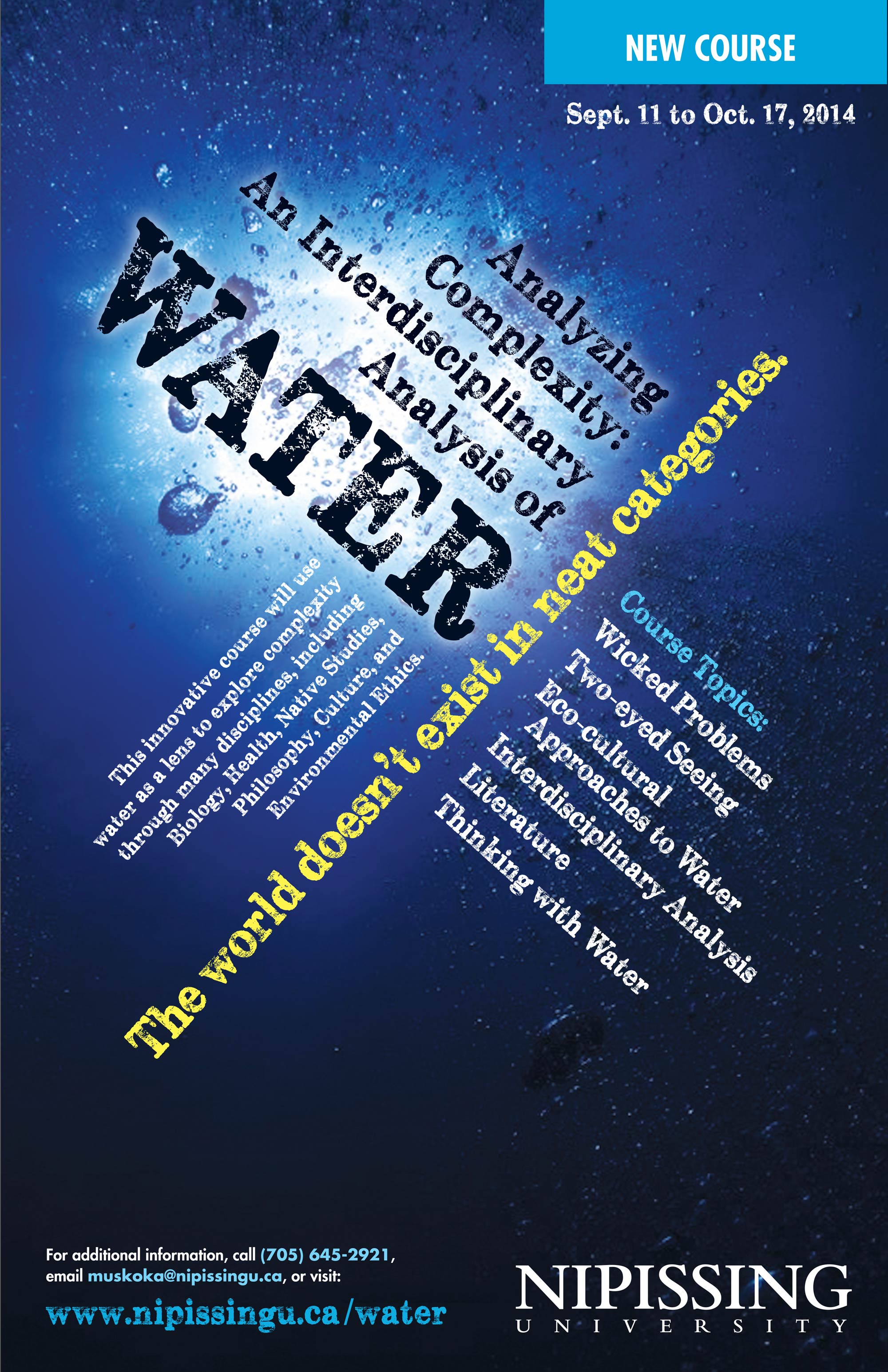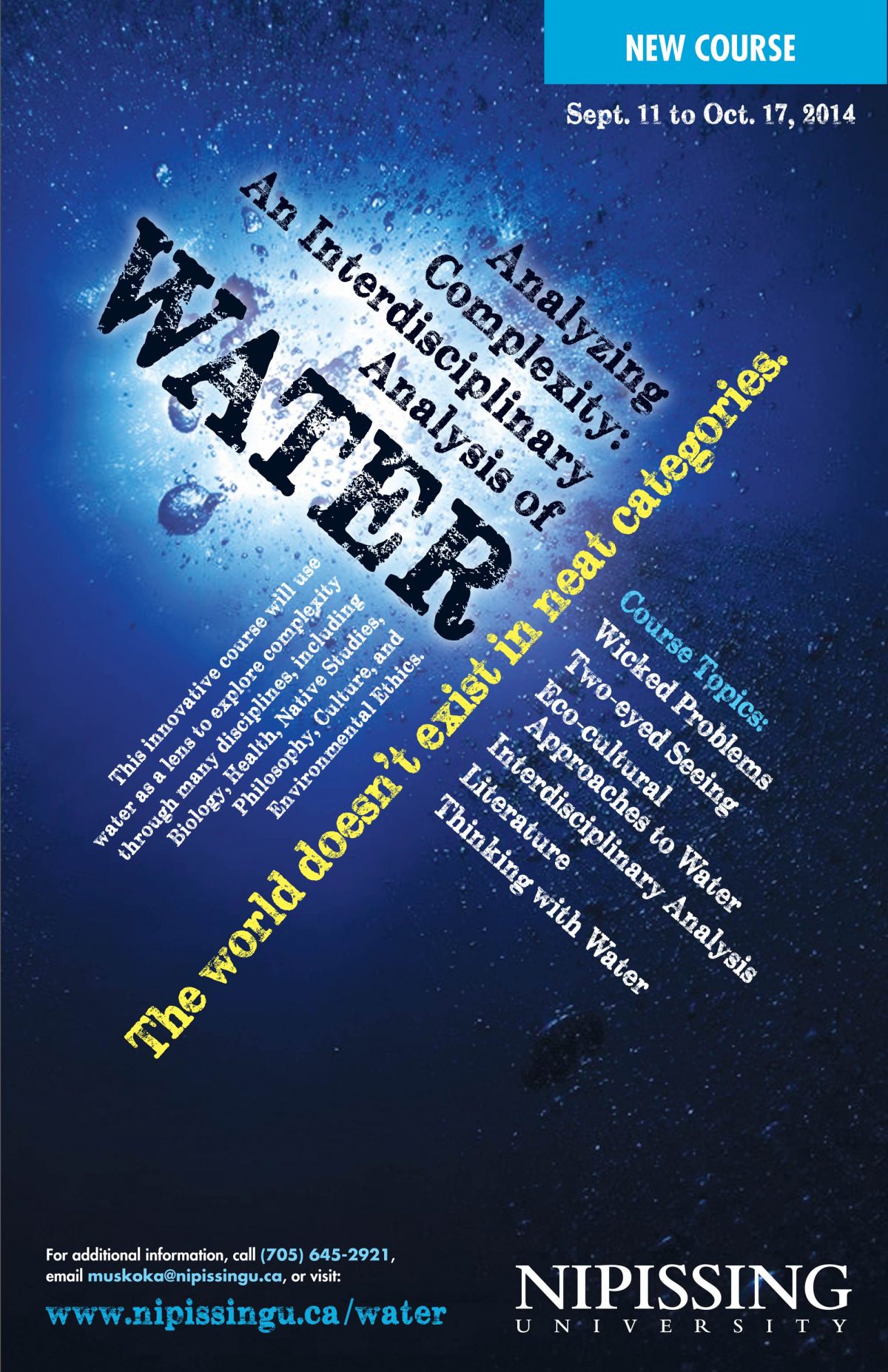WATER
Because the World Doesn’t Exist in Neat Categories…..
WATER was our 4th offering of the interdisciplinary concept course and the first time we offered it in the full format of the Fall/Winter term. With guest lecturers from as far away as Sydney University in Australia to the Northwest Territories the course was a particularly rich interdisciplinary engagement with what came to be called ‘water imaginaries’. The sheer physiological complexity of water’s many different ways of being from liquid to solid, from ice to vapour provided the most powerful questions of the course. Where do we draw the boundaries between us and water, between the animate and the inanimate, between life and death. From Western environmental philosophers, to biologists to indigenous scholars and elders we were continually invited to undo those boundaries we take for granted that separate us from the world and the stuff of which it’s made. Rather than us and the world, reflections on water invited us to consider the impossibility of boundaries that ultimately separate. All being is actually interbeing.
Dr. Robert Hemmings English Studies
“Water, Water Everywhere…”
Overview: The title of this lecture, taken from Samuel Taylor Coleridge’s “Rime of the Ancient Mariner,” acknowledges the ubiquity of water, often figured as a natural life force, and then immediately negates its potential vitality by stripping it of its capacity for sustenance. Water is at once everywhere and unavailable. This lecture looks at water from the disciplinary perspective of English Studies. English Studies is an increasingly interdisciplinary discipline that is interested in a wide range of cultural texts, including novels, poems, plays, films, architecture, advertisements, fashion, and painting, among others. So, in this lecture I examine the literary richness of water by exploring its symbolic potential in poetic and pictorial representations of oceans, lakes, rivers and ponds, in both fluid and frozen forms, and consider the mysteries that lurk beneath surfaces. The lecture is meant to demonstrate some of the techniques of literary inquiry by attentively reading a handful of superb poems by profoundly gifted but diverse poets, starting with the English Romantic poet S.T. Coleridge, and ending up with later 20th century North American poets.
Dr. Astrida Niemanis (Sydney University, Australia) Environmental Humanities
“UNTAPPING WATERSHED MIND”: Water, Justice, and the Environmental Imaginary”
Overview: What does it mean to “untap our watershed mind”? How might reimagining our relationship to water help us protect the bodies of water that sustain all life on earth? In this lecture/discussion, we will weave together research from the natural sciences, social sciences and humanities to explore the meaning of water in our everyday lives, and how that meaning shifts across various social, cultural and economic contexts. As we will discover, how we treat water is strongly related to what we imagine water to be. Key concepts that we will explore include: environmental imaginaries; naturecultures; “bodies of water”; hypersea; and water justice.
Dr. Jennifer Walker Child and Family Studies
“Decolonizing Disciplinarity: Indigenous Perspectives”
Overview: This session will provide an overview of Two-Eyed Seeing, a guiding principle for co-learning coined by Mi’kmaw Elder Albert Marshall. This approach refers to learning to see through two lenses: Indigenous and Western ways of knowing, taking the best from each to improve the way that we live for the benefit of all. We will explore reflections on water from the perspectives of Indigenous peoples. In particular, the relationship between Indigenous women and water will be discussed.
Professor Steve Cairns School of Nursing
“TAKING TO THE WATER: Wilderness canoe trips as a means of travel for personal and group exploration”
Overview: This class will be an experiential engagement with water, taking place on the shores of Lake Muskoka at sunset. Steve Cairns has been a leader in adventure-based education programs for over 25 years. Working for Outward Bound Canada since 2002, he has led wilderness canoe trips through many of the lakes and rivers of Ontario and it is through these experiences that Steve hopes to share WATER as a means of travel for personal and group exploration. Steve’s background in nursing invites us to reflect on the relationship between water and healing.
Dr. Normal Yan (Dorset Environmental Science Centre) Biology
“Solving Major Environmental Problems”
Overview: The overall idea for this class is to: i) prove to the class that society has, on several occasions, solved major environmental problems, ii) take the key elements that were used to solve these problems and assemble them into a generic environmental protection and management model, and iii) used these elements to consider how we could solve the problems that are currently facing Muskoka’s lakes. I will begin the class by demonstrating that we have made great progress in solving the regional, national and international problems that started the environmental movement – lead pollution, DDT and the loss of birds, the “death” of the Great Lakes, and acid rain. As a class, we will then examine the key common features of these recovery stories, noting that solutions required problem recognition, diagnosis, public involvement, and restorative intervention, all of which required social change. We will assemble the common features of these environmental good news stories into a generic environmental protection and management model, then see if this model can help us to solve any of the environmental problems currently facing Muskoka’s waters.
Dr. Rosemary Nagy Gender Equality and Social Justice
“Waterboarding and International Human Rights”
Overview: Is waterboarding a form of torture or an enhanced interrogation technique? Is it “how we baptize terrorists” or a practice in the violation of fundamental human rights? How does the water separating the United States and Cuba (i.e. the Gulf of Mexico) make the practice of waterboarding a seeming exception to American and international laws prohibiting torture? In this lecture we examine the definition, purpose and effects of torture, and ask whether torture can ever be morally or legally justified.
Martha Celis-Salgado (The Flames Lab & ERASMUS) Aquatic Ecosystems/Biology
“Water interpreters: using aquatic organisms to understand the biological outcome of water quality”
Overview: Aquatic organisms are used as water quality indicators; what they do is ‘read’ the water for us. Water chemistry is the basis for aquatic research related to ecological stress, but some organisms help us interpret what is actually happening at the most sensitive end of the biological community when the water quality changes, either for good or for bad. Vast arrays of biological responses provide information on the severity of ecological stress; the complexity of biologically interpreting water quality will be addressed.
Dr. Darren Ferry History
“Colonial Tears: The Exploitation of Water as a Natural Resource in ‘Canada’s’ History, From Contact to the Present Day”
Overview: As a geographical entity, “Canada” is a nation abundant with natural resources, particularly as it concerns the utilization of water. Water has always been essential for the operation and growth of all Canada’s natural resource sectors, and has traditionally been a resource ripe for exploitation. Striking a balance between economic growth and environmental stewardship pertaining to water has been an ongoing challenge since the first European settlers “colonized” this land. This lecture examines the legacy of colonialism as it pertains to water throughout Canada’s history, and will explore the following themes: First Nations and equilibrium with water as a resource; the exploitation of the early fishery; water as transportation; the employments of water in the industrial age; sanitation and the development of lakes and rivers; hydroelectric power and the commodification of water in Canada’s near future.
***MINI CONFERENCE: Decolonizing WATER through Interdisciplinarity*** (Friday/Saturday)
Guest Panel: “Indigenizing WATER: Art as Decolonization”
Dr. Heather Igloliorte (Inuit, Nunatsiavut Territory of Labrador), Assistant Professor, Aboriginal Art History, Concordia University
Dr. Igloliorte’s teaching and research interests center on Inuit and other Native North American visual and material culture, circumpolar art studies, performance and media art, the global exhibition of Indigenous arts and culture, and issues of colonization, sovereignty, resistance and resilience. http://art-history.concordia.ca/people/faculty/igloliorte_heather.php
Dr. Carla Taunton, Assistant Professor, Division of Art History and Critical Studies, NSCAD University Dr. Taunton’s areas of expertise include Indigenous arts and methodologies, contemporary Canadian art, museum and curatorial studies as well as theories of decolonization, anti-colonialism, and settler responsibility. Drawing on collaborative research models, her current research focuses on Indigenous arts-based approaches towards the socio-political projects of decolonization, indigenization and social-justice.
http://nscad.ca/en/home/academicprograms/arthistoryandcriticalstudies/faculty/carlataunton.aspx
Dr. Julie Nagam, Assistant Professor, Indigenous Visual Culture Program, OCAD University
Dr. Nagam’s research interests include a (re)mapping of the colonial state through creative interventions within concepts of native space. She demonstrates knowledge in the areas of cultural geography (urban, rural and remote space), Indigenous critical theory, cultural and post-colonial theory.
http://apache.ocad.ca/faculty_biographies/bio.php?bid=1449&fac=liberal%20studies
Dr. Reehan Mirza Biology
Overview: TBA
Dr. Sal Renshaw Gender Equality and Social Justice
“For Crying Out Loud…a Whirlwind Cultural History of Tears”
Overview: You have to admit…crying is odd. What possible evolutionary purpose could it serve? Why do human babies cry so much when silence seems to be the most reliable survival strategy? And if crying isn’t precisely sexed—let’s face it we all have tear ducts—why does it seem to be so strongly gendered, and has it always been this way? Did Neanderthals cry? Do animals cry? From the mechanics and physiology of crying to the cultural history of tears this class will explore how crying has been understood by a range of human societies. We will reflect on the weeping manliness of the 17th century, the hysterical tears of Freud’s women, and even the faux tears of the 21st century’s sensitive Western male to consider the ways in which crying has been and continues to be a gendered and racialized expression of affect as well as a gendered and racialized expression of power.
______________

